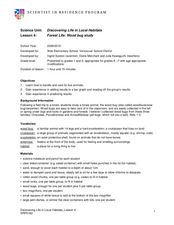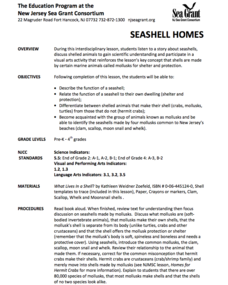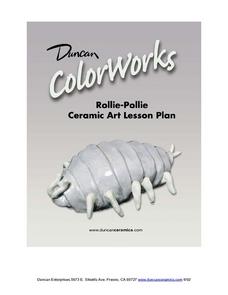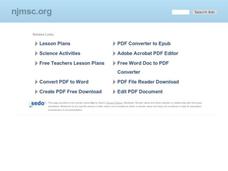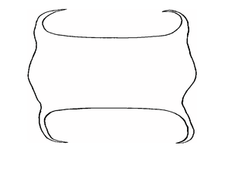Curated OER
Crustacean Dot To Dot
In this science worksheet, 2nd graders will complete a dot to dot. Students will connect the dots from one to ninety-two to create a common crustacean.
Curated OER
Forest Life- Wood Bug Study
Examine wood bugs and their habitat. Learners gather wood bugs and examine their bodies. Then discuss their body parts and how they help them survive. They also predict where they think wood bugs live to then graph the class results.
Curated OER
Homes for Hermit Crabs
Students discover the differences between hermit crabs and mollusks and identify their parts. After reading a story about hermit crabs, they complete an anatomy worksheet. For another activity, students fold and cut a diagram of a hermit...
Curated OER
Seashell Homes
Pupils listen to a story about seashells. They discuss shelled animals. Learners describe the function of seashell. Pupils relate the function of a seashell to their own dwelling. They differentiate between shelled animals that make...
Curated OER
Hermit Crabs in the Classroom
Young scholars interact with hermit crabs in the their classroom. In this hermit crab lesson, students handle and observe hermit crabs while learning about their habitats and how to treat animals. They watch how the animals move and...
Curated OER
Love A Lobster
Learners discuss the appearance of a lobster. Using pre-cut parts, they create their own lobster and name each part of its anatomy. As a class, they listen and participate in exploring background information on the lobster and its...
Curated OER
What Lives In A Shell?
Younger students focus on animals and animal habitats in the lower grades. This resource defining habitats focuses on sea animals with shells, but could be augmented to be a richer experience.
Scholastic
A House for Hermit Crab
Engage young marine biologists in a reading of Eric Carle's A House for Hermit Crab with a fun hands-on activity. Given a set of clipart images of the different aquatic animals that appear in the book, children identify each one during a...
Curated OER
Hermit Crab Races
Students predict the speeds of humans and hermit crabs and investigate their predictions using ratios and formulas. AppleWorks is used for this lesson, which includes a data worksheet.
Curated OER
Spot the Differences
In this spot the difference worksheet, students analyze pictures of two
different crabs to see if they can find five differences between the
two.
ARKive
Dinner at the Reef
Fine dining can happen anywhere, even in the coral reefs. Budding environmentalists explore marine food chains, predator-prey relationships and the importance of a balanced ecosystem. These important concepts are facilitated through a...
Curated OER
Oceans in Motion
This simple activity introduces children to basic marine life as well as to show them the necessity of protecting aquatic environments. Some famous marine life animals are introduced via vocabulary words, then children cut out pictures...
Curated OER
My Own Backyard
Scholars create a drawing of their own backyards. They will use a visualization technique to sketch their own backyard onto construction paper using oil pastels. Guiding questions are given along with materials for the project....
Curated OER
Crab Alphabet Activity
In this crabs learning exercise, students explore crab vocabulary words and practice their alphabetical order knowledge. Students place ten words in ABC order.
Curated OER
Trout Are Made of Trees Crayon Mural
Students recognize that for a trout habitat to be ideal, several components must be present. In this trout lesson, students explore what makes a healthy stream. Students create paintings for a mural of a trout habitat. Students uncover...
Curated OER
Beach Life: Spanish Banks Field Trip
Students discover beach life. In this beach life lesson, students visit a beach to find plant and animal species that live there. They discuss the life cycle and needs of some of these animals through a variety of activities.
Curated OER
Rollie-Pollie - - Ceramic Art
Students are introduced to a variety of sculpting techniques: rolling, pinching and scoring. They practice utilizing additive and subtractive processes in making simple sculptural forms to depict bugs. Each student also interprets...
Curated OER
Oddball Out- Finding the Item that Does Not Belong
In this visual comparison worksheet, young scholars examine 4 rows of plants and animals in order to determine which item does not belong in each row. They check their work with answers which are given at the bottom of the page.
Curated OER
Pond Ecosystem Field Trip
Students investigate the environment by participating in a class trip. In this pond ecosystem lesson, students define a list of vocabulary terms associated with ponds such as invertebrate and metamorphosis. Students attend a field trip...
Curated OER
Comparing and Contrasting
Students practice compare and contrast skills. In this science and language development lesson, students complete a T chart generating traits of a snail and a clam. Students complete a related worksheet.
Curated OER
Brine Shrimp Life Cycle
Second graders investigate the life cycle of the brine shrimp. They use a variety of resources to find the details of each step. Students compare the life cycles of different organisms. They create diagrams of the different stages while...
Curated OER
Skates
Students gain understanding of structure, characteristics, and basic needs of living things and their role in world, identify parts of skate, observe details of skate's body and skate egg case, and identify unique characteristics of skates.
Curated OER
Build A "Bug"
Students brainstorm different adaptations that bug would need to live in aquatic environment, and watch presentation where classmate is dressed up in costume to represent adaptations necessary for macroinvertebrate to survive in water.
Other popular searches
- Marine Crustaceans
- Shells and Crustaceans
- Crustaceans of the Ocean
- Crustaceans Kindergarten
- Crustaceans 2nd Grade
- Crustaceans Animals



